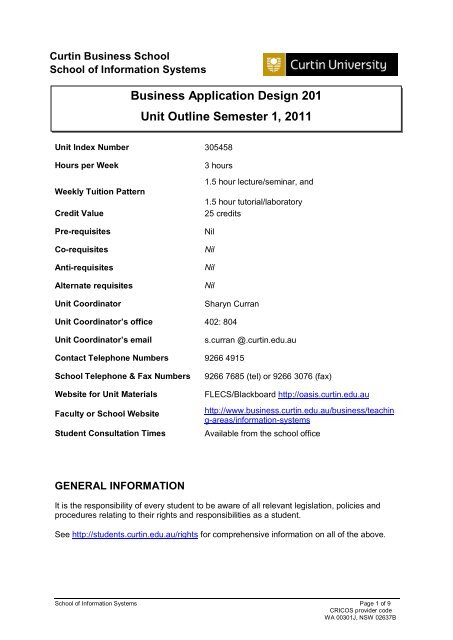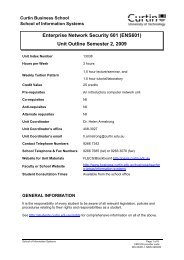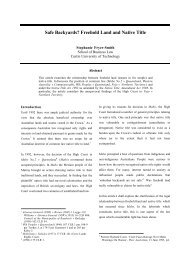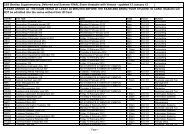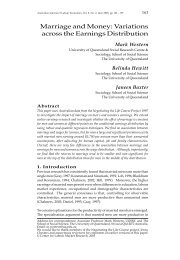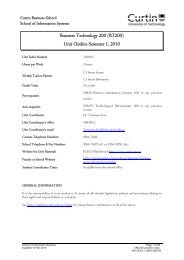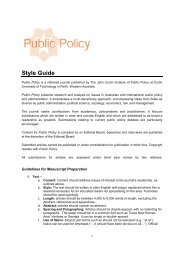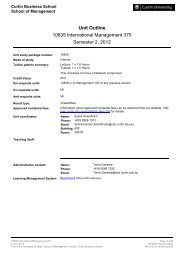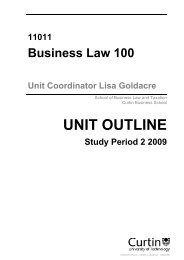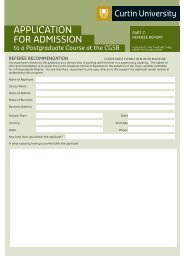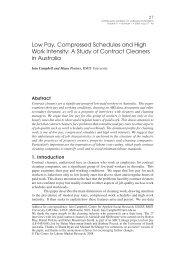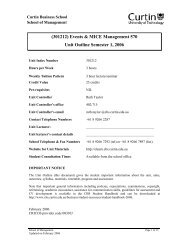Unit Outline (Bentley Students) - Curtin Business School
Unit Outline (Bentley Students) - Curtin Business School
Unit Outline (Bentley Students) - Curtin Business School
Create successful ePaper yourself
Turn your PDF publications into a flip-book with our unique Google optimized e-Paper software.
<strong>Curtin</strong> <strong>Business</strong> <strong>School</strong><br />
<strong>School</strong> of Information Systems<br />
<strong>Business</strong> Application Design 201<br />
<strong>Unit</strong> <strong>Outline</strong> Semester 1, 2011<br />
<strong>Unit</strong> Index Number 305458<br />
Hours per Week<br />
Weekly Tuition Pattern<br />
Credit Value<br />
Pre-requisites<br />
Co-requisites<br />
Anti-requisites<br />
Alternate requisites<br />
<strong>Unit</strong> Coordinator<br />
3 hours<br />
1.5 hour lecture/seminar, and<br />
1.5 hour tutorial/laboratory<br />
25 credits<br />
Nil<br />
Nil<br />
Nil<br />
Nil<br />
Sharyn Curran<br />
<strong>Unit</strong> Coordinator’s office 402: 804<br />
<strong>Unit</strong> Coordinator’s email<br />
s.curran @.curtin.edu.au<br />
Contact Telephone Numbers 9266 4915<br />
<strong>School</strong> Telephone & Fax Numbers<br />
Website for <strong>Unit</strong> Materials<br />
Faculty or <strong>School</strong> Website<br />
Student Consultation Times<br />
9266 7685 (tel) or 9266 3076 (fax)<br />
FLECS/Blackboard http://oasis.curtin.edu.au<br />
http://www.business.curtin.edu.au/business/teachin<br />
g-areas/information-systems<br />
Available from the school office<br />
GENERAL INFORMATION<br />
It is the responsibility of every student to be aware of all relevant legislation, policies and<br />
procedures relating to their rights and responsibilities as a student.<br />
See http://students.curtin.edu.au/rights for comprehensive information on all of the above.<br />
<strong>School</strong> of Information Systems Page 1 of 9<br />
CRICOS provider code<br />
WA 00301J, NSW 02637B
GENERAL INFORMATION ................................................................................................ 1<br />
UNIT INFORMATION.......................................................................................................... 3<br />
1. Aims ......................................................................................................................................................... 3<br />
2. Outcomes ................................................................................................................................................ 3<br />
3. Syllabus ................................................................................................................................................... 3<br />
4. Learning Resources ............................................................................................................................... 4<br />
5. Timetable of Classes .............................................................................................................................. 4<br />
6. Program ................................................................................................................................................... 4<br />
7. Assessment............................................................................................................................................. 5<br />
7.2 Assessment Details ................................................................................................................................ 5<br />
7.3 Referencing Style ................................................................................................................................... 6<br />
7.4 Assignment Marking Guide .................................................................................................................... 6<br />
7.5 Plagiarism................................................................................................................................................ 6<br />
7.6 Plagiarism Monitoring ............................................................................................................................. 6<br />
7.7 Fair assessment through moderation.................................................................................................... 6<br />
7.8 Assessment Compliance Information.................................................................................................... 6<br />
7.9 Penalty for Late Submission of Assessments ...................................................................................... 7<br />
7.10 Relationship of Assessment Activities to Learning Outcomes and Professional Skills .................... 7<br />
8. Student’s Rights and Responsibilities ................................................................................................... 7<br />
9. Additional Information............................................................................................................................. 8<br />
Undergraduate Supplementary and Deferred Examinations....................................................................... 8<br />
Postgraduate Deferred Examinations ........................................................................................................... 8<br />
10. Recent unit changes ............................................................................................................................... 9<br />
<strong>School</strong> of Information Systems Page 2 of 9<br />
CRICOS provider code<br />
WA 00301J, NSW 02637B
UNIT INFORMATION<br />
1. Aims<br />
The aims of this unit are to:<br />
1. Explain the Software Development Process<br />
2. Formally state a problem.<br />
3. Devise an algorithm to solve the problem.<br />
4. Translate the algorithm into a program using an appropriate programming language.<br />
5. Understand and use a programming environment (IDE / Editor).<br />
6. Appreciate the use of different data types in a program.<br />
7. Understand the use of different programming constructs (Sequence, Selection,repetition)<br />
for different purposes.<br />
8. Execute and debug a program.<br />
2. Outcomes<br />
2.1 Learning Outcomes<br />
On successful completion of this unit, students should be able to:<br />
1. Formally state a problem, devise an algorithm to solve the problem, and translate<br />
the algorithm into a program using an appropriate programming language.<br />
2. Explain the use of different data types and algorithm constructs (sequence,<br />
selection, repetition) for different purposes.<br />
3. Apply standard techniques and notations to dev document and [use] a program<br />
testing strategy<br />
4. Demonstrate the use of a programming environment – IDE to edit, execute and<br />
debug programs.<br />
5. Apply standard techniques to evaluate and measure algorithm/program design.<br />
2.2 Graduate Attributes and Professional Skills Outcomes<br />
Employers worldwide want graduates who have developed effective professional skills and<br />
attributes. The CBS graduate attributes and professional skills program includes<br />
communication (writing, interpersonal interactions and cultural awareness, and presenting),<br />
critical and creative thinking (problem solving and decision making), team work, IT literacy,<br />
information literacy, international perspectives and life-long learning.<br />
On successful completion of this unit, students should be able to:<br />
1. Critical and Creative Thinking: Problem Solving<br />
a.Identify problems and analyze the main features;<br />
b. Apply appropriate problem solving processes, arguments, critical and<br />
creative thinking;<br />
c. Identify, implement and evaluate strategies for the resolution of problems<br />
2. Create innovative solutions<br />
3. Syllabus<br />
Problem analysis, algorithm development, simple program design techniques, study of a<br />
contemporary programming language, use of a computer environment and appropriate<br />
system software.<br />
<strong>School</strong> of Information Systems Page 3 of 9<br />
CRICOS provider code<br />
WA 00301J, NSW 02637B
4. Learning Resources<br />
4.1 Texts<br />
You will need to purchase the following textbook in order to complete this unit<br />
Lutes, K. & Harriger, A. (2009). An Information Systems Approach to Object Oriented<br />
Programming: Using Microsoft Visual C# Express<br />
Please note that this book is ONLY available through <strong>Curtin</strong> University Bookshop as it<br />
Is under licence to the authors.<br />
4.2 Recommended Texts<br />
There are many texts available in the library that focus on Visual Studio and C#. Any of these<br />
will meet the introductory nature of this unit.<br />
The main site for Alice 2.2 is www.Alice.org. – other information will be placed on Flecs-<br />
BlackBoard with regard to appropriate web-sites.<br />
5. Timetable of Classes<br />
Refer to “<strong>Unit</strong> & Course information” at http://www.cbs.curtin.edu.au/students for timetable<br />
updates.<br />
6. Program<br />
Semester One<br />
Week Begin Date Lecture/Seminar Pre-readings Tutorial/<br />
Laboratory<br />
1. 28 Feb Introduction –<br />
Understanding<br />
Structure<br />
Surface<br />
The Essentials of Alice<br />
2. 07 March Making Decisions Teaching Characters to<br />
Walk<br />
3. 14 March Looping The Simple Quiz<br />
Introduction to C #<br />
4. 21 March Data and Objects Chapter 2<br />
Chapter 3<br />
How Tall are You<br />
Complete the exercise in<br />
Chapter 2<br />
Assessment<br />
Due<br />
5. 28 March Manipulating Data Chapter 4 TBA<br />
6. 04 April Program Flow<br />
and decisions<br />
Chapter 5 Lab Test in Tutorial Time<br />
slot<br />
7. 11 April Exceptions Chapter 6 TBA<br />
Lab test 1<br />
Alice Learning Methods<br />
8. 18 April Methods Chapter 7 TBA<br />
Alice Learning Methods 2<br />
9. 25 April Tuition Free Week includes Easter<br />
10. 02 May Looping in Forms Chapter 8 TBA<br />
11. 09 May Arrays Chapter 9 TBA<br />
12. 16 May Principles of OO TBA<br />
13. 23 May Review Lab test 2<br />
14. 30 May Study Week<br />
15. 06 June Exams Week 1<br />
16. 13 June Exams Week 2<br />
<strong>School</strong> of Information Systems Page 4 of 9<br />
CRICOS provider code<br />
WA 00301J, NSW 02637B
7. Assessment<br />
7.1 Summary<br />
To pass this unit you must:<br />
a) Receive an overall grade of 5 or above and a mark greater than or equal to 50,<br />
AND<br />
b) Complete the Practical Tests, AND<br />
c) Pass the exam<br />
No. Assessment Activity Percentage %<br />
1 Weekly Quiz 10%<br />
2 Weekly Practical Work 10%<br />
3 2 X Laboratory Tests<br />
30%<br />
Test 1 : 10%<br />
Test 2: 20%<br />
4 Exam 50%<br />
Total 100%<br />
The assessments are due as per the Program above.<br />
7.2 Assessment Details<br />
7.2.1 Item 1<br />
There are 10 weekly Quizzes conducted through Flecs-Blackboard which will be made<br />
available to students on Tuesday of each week commencing in week 2. <strong>Students</strong> must<br />
complete the quiz (based on the preceding week’s topic) by Monday of the following week.<br />
7.2.2 Item 2<br />
Each week a piece of set work is required to be completed by the following tutorial. Each<br />
week’s set work presumes completion of the previous work. Programming is a practice<br />
based learning activity; the more you do, the better you become. Activities set in tutorial<br />
class time involving the use of technologies as advised by the tutor, in this case the Surface<br />
unit must be submitted to the tutor by the end of the tutorial.<br />
7.2.3 Item 3<br />
There are two practical tests held in the laboratory timeslot indicated in the semester<br />
program. The first test will evaluate the ability to problem solve and demonstrate an<br />
understanding of the Alice environment. The 2 nd test will be a program in C# that covers the<br />
concepts of problem solving and implementation in C#<br />
7.2.4 Examination<br />
A closed book exam will be held in the university examination period. The exam will be of 2<br />
hours duration and cover material from the semester.<br />
<strong>School</strong> of Information Systems Page 5 of 9<br />
CRICOS provider code<br />
WA 00301J, NSW 02637B
7.3 Referencing Style<br />
<strong>Students</strong> should use the [insert preferred referencing style here] referencing style when<br />
preparing assignments. More information can be found on this style from the Library web<br />
site: http://library.curtin.edu.au/research_and_information_skills/referencing<br />
7.4 Assignment Marking Guide<br />
The following is the guide used to mark the 2nd assignment from last semester. The actual<br />
assignment and guide will be made available via BlackBoard and may be slightly different.<br />
Marks Allocation<br />
1. Pseudocode : 30 marks max. To achieve max marks your pseudocode will include variables and methods.<br />
2. Code:<br />
2.1 A working solution with no methods will score 30 marks<br />
2.2 The remaining 40 marks will be allocated for the following:<br />
2.2.1 A correct main() – this includes calls to the methods (some marks will be awarded if<br />
the program doesn’t execute).<br />
2.2.2 Correct method headers ( even if the method doesn’t work)<br />
2.2.3 Method bodies which are correct.<br />
2.2.4 Use of validation and a loop where applicable.<br />
7.5 Plagiarism<br />
Plagiarism occurs when work or property of another person is presented as one’s own,<br />
without appropriate acknowledgement or referencing. Plagiarism is a serious offence. For<br />
more information refer to http://academicintegrity.curtin.edu.au<br />
7.6 Plagiarism Monitoring<br />
Some (or all) assessments in this unit will be monitored for plagiarism using Turnitin<br />
plagiarism detection service (see http://turnitin.com). <strong>Students</strong> who do not want assignments<br />
retained in the Turnitin database, must lodge a special request prior to the submission date.<br />
For further advice see http://academicintegrity.curtin.edu.au/studentsturnitin.html.<br />
7.7 Fair assessment through moderation<br />
Moderation describes a quality assurance process to ensure that assessments are<br />
appropriate to the learning outcomes, and that the student work is consistently evaluated by<br />
assessors. Minimum standard for the moderation of assessment are described in the<br />
Assessment Manual, available from:<br />
http://policies.curtin.edu.au/policies/teachingandlearning.cfm<br />
7.8 Assessment Compliance Information<br />
Due dates will be strictly adhered to. Extensions will be granted only in cases of<br />
demonstrated urgent need. It is your responsibility to check the due date.<br />
<strong>School</strong> of Information Systems Page 6 of 9<br />
CRICOS provider code<br />
WA 00301J, NSW 02637B
The Final Exam will be held during the formal examination period. It is the student’s<br />
responsibility to check the date and time of the Final Exam on the <strong>Curtin</strong> website.<br />
Official release results for this unit are published on Oasis on the <strong>Curtin</strong> website.<br />
http://oasis.curtin.edu.au<br />
7.9 Penalty for Late Submission of Assessments<br />
e.g. If assignments are not submitted by the due date, a penalty of 10% per day will be<br />
deducted from the assessment mark and after seven (7) days a zero mark will be recorded.<br />
It is the student’s responsibility to keep appropriate copies/backups of every assignment<br />
submitted.<br />
7.10 Relationship of Assessment Activities to Learning Outcomes and<br />
Professional Skills<br />
This table illustrates how the assessment activities relate to the assessment of the learning<br />
outcomes and professional skills.<br />
Outcomes<br />
Assessment Activity<br />
Learning Outcomes Item 1 Item 2 Item 3 Exam<br />
formally state a problem, devise an QUIZ Practical Work Test √<br />
algorithm to solve the problem, and<br />
translate the algorithm into a program<br />
using an appropriate programming<br />
language<br />
Explain the use of different data types QUIZ Test √<br />
and algorithm constructs (sequence,<br />
selection, repetition) for different<br />
purposes.<br />
Apply standard techniques and<br />
notations to dev document and [use] a<br />
program testing strategy<br />
QUIZ Practical Work Test √<br />
Demonstrate the use of a programming<br />
environment – IDE to edit, execute and<br />
debug programs.<br />
Practical Work<br />
Test<br />
Apply standard techniques to evaluate<br />
and measure algorithm/program design<br />
√<br />
8. Student’s Rights and Responsibilities<br />
It is the responsibility of every student to be aware of all relevant legislation, policies and<br />
procedures relating to their rights and responsibilities as a student. These include:<br />
<br />
<br />
<br />
the Student Charter,<br />
the University’s Guiding Ethical Principles,<br />
the University’s policy and statements on plagiarism and academic integrity,<br />
<strong>School</strong> of Information Systems Page 7 of 9<br />
CRICOS provider code<br />
WA 00301J, NSW 02637B
copyright principles and responsibilities,<br />
the University’s policies on appropriate use of software and computer facilities,<br />
students’ responsibility to check enrolment,<br />
deadlines, appeals, and grievance resolution,<br />
student feedback,<br />
other policies and procedures<br />
electronic communication with students<br />
See http://www.students.curtin.edu.au/rights for comprehensive information on all of the<br />
above.<br />
9. Additional Information<br />
Undergraduate Supplementary and Deferred Examinations<br />
For more detailed information on Policies and Procedures relating to Examinations, students<br />
should refer to the WWW at: http://examinations.curtin.edu.au/students/sup_exam.cfm#defer<br />
If you are awarded a supplementary examination or apply for and are awarded a deferred<br />
examination at the end of first semester 2011 in this unit, then the supplementary/deferred<br />
examination for the <strong>School</strong> of Information Systems will normally be held in July 2011.<br />
A student who does not sit for a scheduled supplementary/deferred examination in a<br />
unit has no claim to a further examination and therefore will receive a FAIL GRADE in<br />
this unit.<br />
Due to time constraints, NO supplementary and/or deferred examinations will be<br />
offered offshore for students studying on-campus at <strong>Curtin</strong> University (Western<br />
Australia) in Semester 1, 2011.<br />
Note - It is a student's responsibility to obtain all relevant information regarding these<br />
examinations and to be present at the correct time and venue.<br />
Postgraduate Deferred Examinations<br />
For more detailed information on Policies and Procedures relating to Examinations, students<br />
should refer to the WWW at: http://examinations.curtin.edu.au/students/sup_exam.cfm#defer<br />
The <strong>Curtin</strong> <strong>Business</strong> <strong>School</strong> does not award supplementary examinations in postgraduate<br />
units. If you apply for and are awarded a deferred examination at the end of first semester<br />
2011 in this unit, then the deferred examination for the <strong>School</strong> of Information Systems will<br />
normally be held in July 2011.<br />
A student who does not sit for a scheduled deferred examination in a unit has no claim to a<br />
further examination and therefore will receive a FAIL GRADE in this unit.<br />
<strong>Students</strong> at local centres other than the <strong>Bentley</strong> Campus are required to contact their<br />
centres for details of time and venue of the deferred examinations two weeks prior to the<br />
examinations.<br />
Due to time constraints, NO deferred examinations will be offered offshore for<br />
students studying on-campus at <strong>Curtin</strong> University (Western Australia) in Semester 1,<br />
2011.<br />
Note - It is a student's responsibility to obtain all relevant information regarding these<br />
examinations and to be present at the correct time and venue.<br />
<strong>School</strong> of Information Systems Page 8 of 9<br />
CRICOS provider code<br />
WA 00301J, NSW 02637B
10. Recent unit changes<br />
We welcome feedback as one way to keep improving this unit. <strong>Students</strong> are encouraged to<br />
give unit feedback through eVALUate, <strong>Curtin</strong>’s online feedback systems (see<br />
http://evaluate.curtin.edu.au<br />
Recent changes to this unit include:<br />
1. New technologies – Surface - design<br />
2. Evolvement of Alice – separation of design<br />
3. Earlier focus on C#<br />
END OF UNIT INFORMATION<br />
<strong>School</strong> of Information Systems Page 9 of 9<br />
CRICOS provider code<br />
WA 00301J, NSW 02637B


